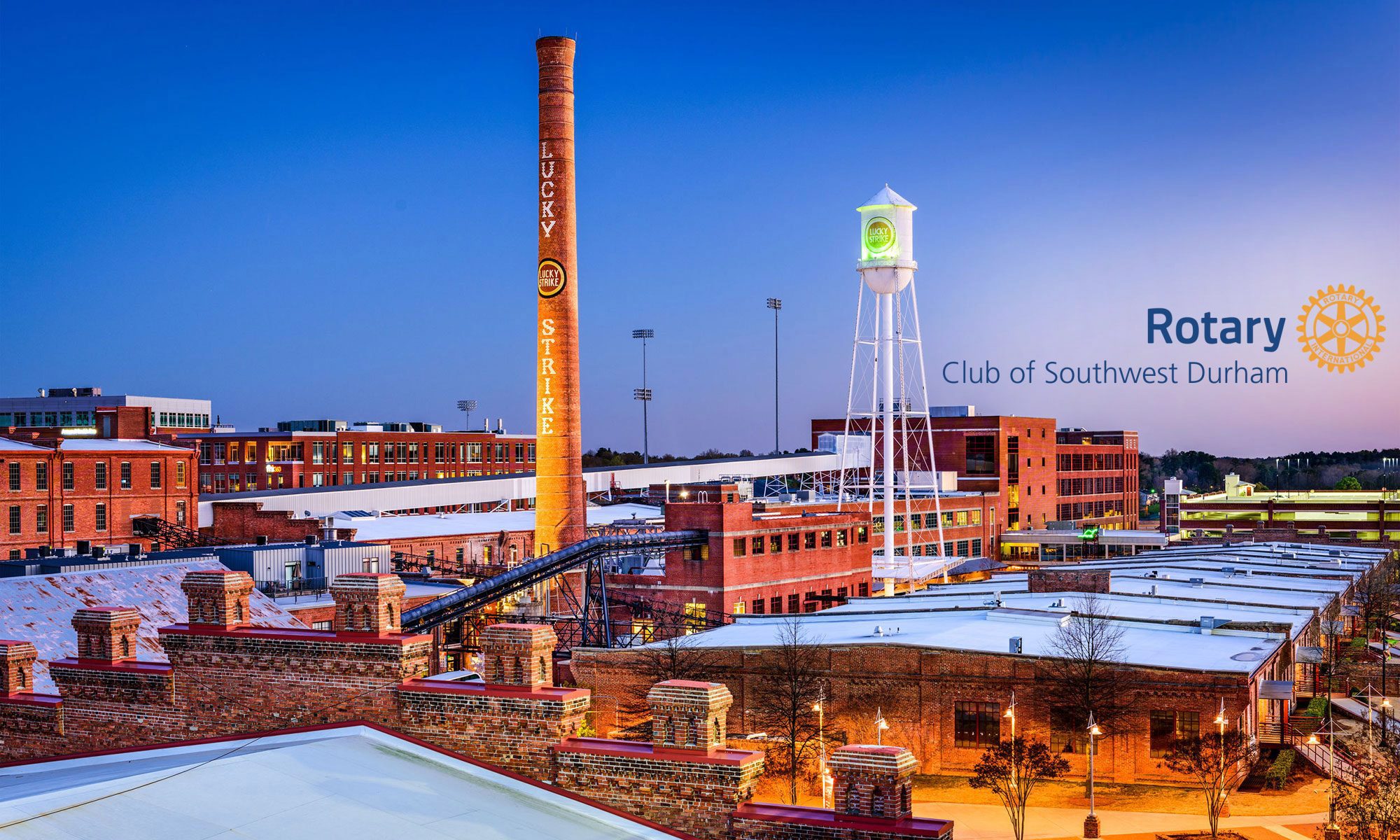Check out this video below that the students in the Interact Club we sponsor at the North Carolina School of Science and Math made. We’re so proud of them!
RYLA 2019
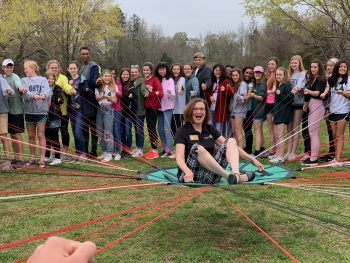 This month I had the pleasure of being a senior counselor at RYLA, the Rotary Youth Leadership Awards, for Rotary District 7710. RYLA, which takes place all over the world, is a leadership conference for high school students that Rotary identifies as strong potential leaders. Each district plans the curriculum for and organizes the conference however it best deems fit. I visited our RYLA, which takes place at Camp Oak Hill, about an hour away from Durham near the Virginia border, last year, but this was my first year as a counselor staying overnight for the whole weekend.
This month I had the pleasure of being a senior counselor at RYLA, the Rotary Youth Leadership Awards, for Rotary District 7710. RYLA, which takes place all over the world, is a leadership conference for high school students that Rotary identifies as strong potential leaders. Each district plans the curriculum for and organizes the conference however it best deems fit. I visited our RYLA, which takes place at Camp Oak Hill, about an hour away from Durham near the Virginia border, last year, but this was my first year as a counselor staying overnight for the whole weekend.
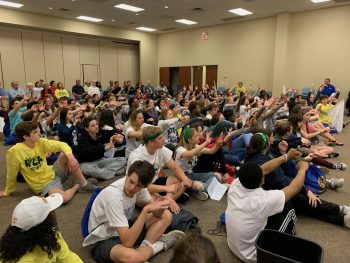 The RYLA kids aren’t told anything about how the conference works ahead of time, intentionally, and efforts are taken to separate kids from the same high school in bunks or groups they participate in. Many of the kids coming don’t know a single person there. Some of them are nervous about this, not realizing that almost everyone is in the same boat. Because of this, I won’t go into too much detail about the activities that they all participate in over the weekend, but I will tell you it’s a very hands-on experience. They don’t spend all weekend sitting in classrooms listening to lectures on leadership. Instead, they spend the time doing things meant to push them outside their comfort zones, how to support teammates, work in groups of people they don’t know well (or at all) to achieve tasks — they learn how to be leaders, and how leadership
The RYLA kids aren’t told anything about how the conference works ahead of time, intentionally, and efforts are taken to separate kids from the same high school in bunks or groups they participate in. Many of the kids coming don’t know a single person there. Some of them are nervous about this, not realizing that almost everyone is in the same boat. Because of this, I won’t go into too much detail about the activities that they all participate in over the weekend, but I will tell you it’s a very hands-on experience. They don’t spend all weekend sitting in classrooms listening to lectures on leadership. Instead, they spend the time doing things meant to push them outside their comfort zones, how to support teammates, work in groups of people they don’t know well (or at all) to achieve tasks — they learn how to be leaders, and how leadership 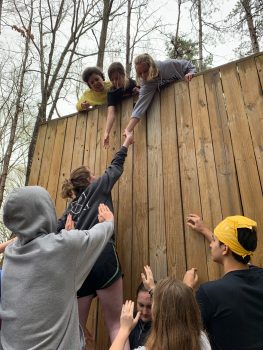
can look different than what they thought when they came in.
One of the most special parts about RYLA is that most of the activities are lead by previous RYLA participants (from just one year prior!), peer counselors. As senior staff counselors, we’re really just there as backups, and get to see how these kids bond and support each other, lead and grow — it’s truly inspiring. At the end of each RYLA, we ask the kids who attended if they want to come back as peer counselors for the following year, and this year, 75% of the kids want to come back next year to help the year behind them.
RYLA is entirely paid for by Rotary clubs, costing about $325 per student, so it doesn’t cost the attendees anything at all. Below are some pictures from the weekend. I hope it inspires you to think about becoming more involved in RYLA.
A Final Update from Global Scholar Catherine Ward
Catherine Ward, who recently graduated from Duke University, is a Rotary Scholar studying at the University of Cambridge. She is sponsored by Southwest Durham Rotary Club. Below is third update after having arrived in the U.K. See her earlier posts here, here and here.
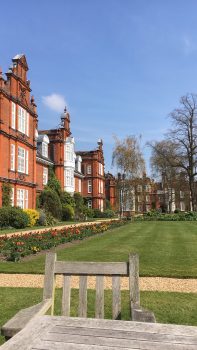 Happy Easter Weekend! Around this time last year we met for the first time during my club-level interview, and I am so glad we did. What a whirlwind year it has been since then! I still can’t believe how lucky I am to be in Cambridge and to have Rotary’s support here.
Happy Easter Weekend! Around this time last year we met for the first time during my club-level interview, and I am so glad we did. What a whirlwind year it has been since then! I still can’t believe how lucky I am to be in Cambridge and to have Rotary’s support here.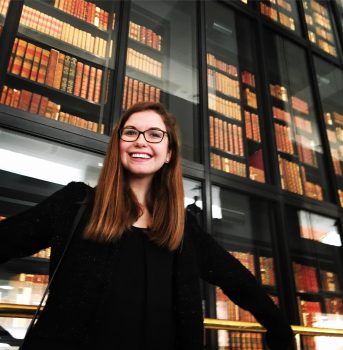 I took a day trip to London this week and wandered the British Library. As a former English major and long-time history lover, seeing Jane Austen’s writing desk, original Brontë sister manuscripts, Shakespeare’s first folio, the Magna Carta, and incredibly elaborate illuminated manuscripts was very fun. I stay in awe of the opportunities I have here. I am attaching a photo of my excitement at the British Library.
I took a day trip to London this week and wandered the British Library. As a former English major and long-time history lover, seeing Jane Austen’s writing desk, original Brontë sister manuscripts, Shakespeare’s first folio, the Magna Carta, and incredibly elaborate illuminated manuscripts was very fun. I stay in awe of the opportunities I have here. I am attaching a photo of my excitement at the British Library. 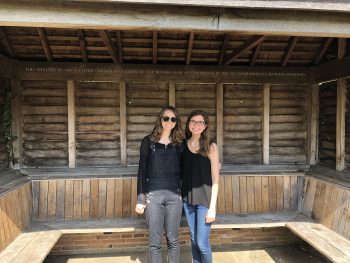 To celebrate the warm weather, I spent time yesterday wandering through the Cambridge Botanic Gardens. A fellow Rotary Global Grant Scholar and I took a picture under the Rotary sign in the gardens. We both talk often about our deep appreciation for Rotary, and I have learned a great deal from her through our conversations related to how our research relates to different Rotary themes.
To celebrate the warm weather, I spent time yesterday wandering through the Cambridge Botanic Gardens. A fellow Rotary Global Grant Scholar and I took a picture under the Rotary sign in the gardens. We both talk often about our deep appreciation for Rotary, and I have learned a great deal from her through our conversations related to how our research relates to different Rotary themes. Wine Raffle Winners
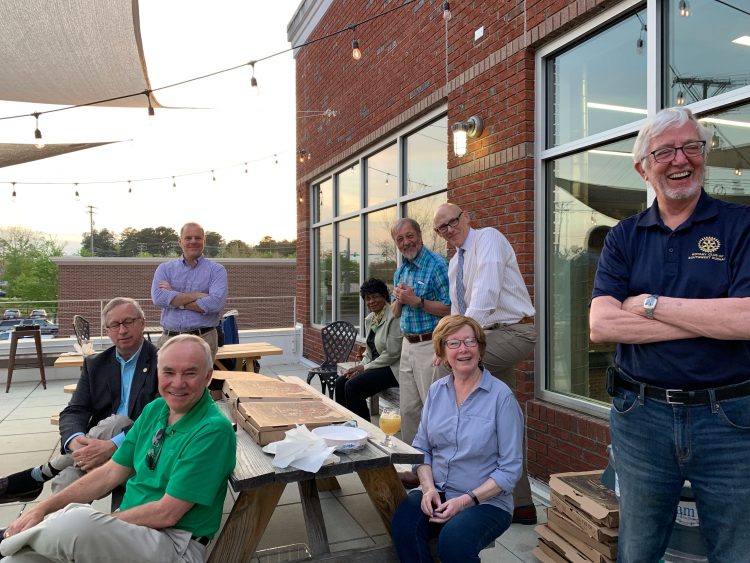 Thanks to everyone who bought tickets for our wine raffle fundraiser! We raised over $12,000 to help fund our 2019-2020 projects. We had a great time kicking off our 40th anniversary year at Sam’s Bottle Shop.
Thanks to everyone who bought tickets for our wine raffle fundraiser! We raised over $12,000 to help fund our 2019-2020 projects. We had a great time kicking off our 40th anniversary year at Sam’s Bottle Shop.
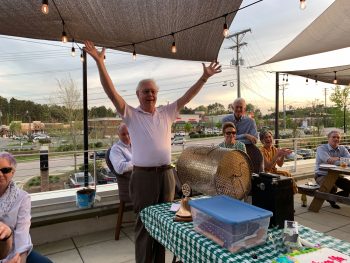 The winners are:
The winners are:
- Grand prize (wine for a year): Gary Kayye
- A case of wine: Matt Cooper
- Six bottles of wine: Conrad Rensburg
- Six bottles of wine: Richard Rand
- Two bottles of wine: Jim Brown
- Two bottles of wine: John Rasmussen
- Two bottles of wine: Susan Copeland
- One bottle of wine: Jo Beth Riceh
- One bottle of wine: Joe Jernigan
- One bottle of Wine: Reinhard Weise
- One bottle of wine: Jennifer Brown
- One bottle of wine: Tonya Bickenship
- One bottle of wine: Debbie Lynch
Congratulations! If you haven’t claimed your prize yet, please email Holt Whiting.
An Update from Global Scholar Catherine Ward
“I haven’t seen my mother in three years, but I have her smile. Her smile is my smile. But when I get to talk to her she cries.” I was talking to a young man who sought asylum here unaccompanied from Eritrea, and of his family, he told me this. He was excited that I knew of Calais, the camp he spent time in where police twice broke his leg. He takes his English language study seriously. He has aspirations of gaining English fluency, working, and moving to London to be closer to the Eritrean Church there. He has local friends and always shows his teachers and social workers respect. He gets frustrated when other kids don’t show that sort of respect to adults and peers. My research is for children like him.
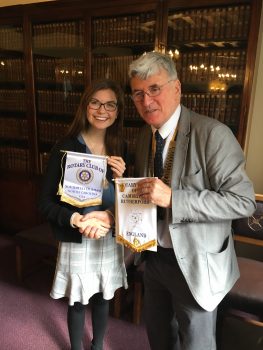 I have interviewed practitioners in a variety of sectors in East England as I seek to better understand ‘belonging’ in educational spaces for unaccompanied asylum seeking children (UASCs). Today, I had the chance to share my research with Cambridge Rutherford Rotary, my host club here. Last week, I had dinner with my Rotary host and his wife. Rotary’s support here has been splendid, and I enjoyed passing a Southwest Durham Rotary flag to my Cambridge hosts today at Queen’s College Cambridge. I am including a photo of me exchanging flags with the president of the club here — I will give you the Cambridge Rutherford Club flag for the Durham Southwest Club when I see you next. 🙂
I have interviewed practitioners in a variety of sectors in East England as I seek to better understand ‘belonging’ in educational spaces for unaccompanied asylum seeking children (UASCs). Today, I had the chance to share my research with Cambridge Rutherford Rotary, my host club here. Last week, I had dinner with my Rotary host and his wife. Rotary’s support here has been splendid, and I enjoyed passing a Southwest Durham Rotary flag to my Cambridge hosts today at Queen’s College Cambridge. I am including a photo of me exchanging flags with the president of the club here — I will give you the Cambridge Rutherford Club flag for the Durham Southwest Club when I see you next. 🙂 Fundraiser: The Wine Raffle is Back!
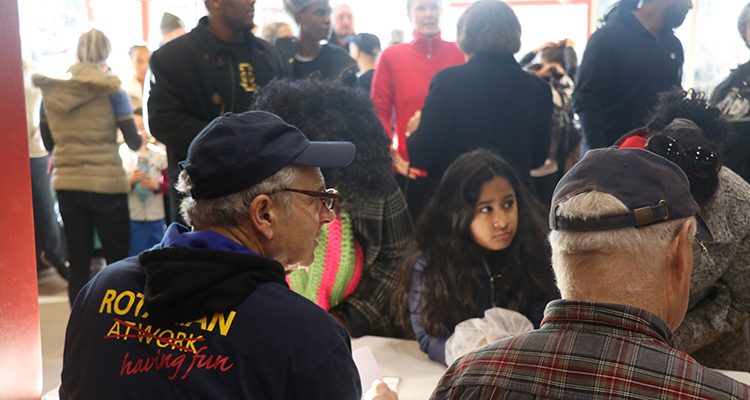
It’s that time of year again! We’re holding our annual wine raffle fundraiser in early April, and we’re selling raffle tickets. Tickets are $10 each, and prizes are various bottles of wine — the grand prize is wine for a year — that’s 52 bottles of wine, donated by our fantastic sponsor, Sam’s Bottle Shop in Durham. There will be at least 10 raffle winners, with other prizes ranging from one to twelve bottles of wine per winner. The winning tickets will be drawn live at our event on April 11th, which will be held at Sam’s Bottle Shop at 6:30 p.m.
All money from the raffle fundraiser will go to the Southwest Durham Rotary Foundation, which puts money back into projects the club members work on both locally in Durham and across the world. Help support a good cause and you could win a fantastic wine prize! If you’d like to buy tickets, please contact us at swdrotary@gmail.com before April 5th.
Projects we completed in 2018-2019 with proceeds from the 2018 wine raffle include:
Fill That Bus
- Helped to collect school supplies for Durham Public School teachers
- Effort collected over $100,000 in school supplies
- History on this event – started by the Southwest Durham Rotary club seven years ago with the support of the other area Rotary Clubs
- Over the duration of the time in which we have been involved we have collected over $500,000 in school supplies for DPS teachers
- By the end of this year the SWDR Foundation will have donated $27,000 to Crayons2Calculators
Urban Ministries of Durham
- Long standing project of collecting toiletries from club members throughout the year to donate for the packaging of sanitary kits (also donated to Caring House)
- Serve breakfast three to four times per year
- Spent a day decorating the family area and the Café for the December holidays
- Hosted a craft table and brought Santa Claus to the Holiday Party for the children staying at Urban Ministries
- Facilitated the donation of tricycles as part of a district project
Dental Bus
- Five to six dentist Rotarians worked in conjunction with support staff and other volunteer Rotarians to serve underserved individuals at TROSA and UMD, providing free dental care totaling over $60,000
- SWDR provided the funding for the rental of the dental bus
MLK Day of Service Meal Packaging Event
- Packaged over 106,000 meals that were distributed to food pantries in Wake, Durham, Johnston and Orange Counties
- Fifth year of the event
Support the Rotary Peace Center at Duke/UNC and serve as host counselors to recipients
Commitment to Youth
- Support the Rotary Youth Exchange Program
- Sponsor Durham students to travel abroad
- Host In-bound students from other countries to spend nine months in Durham
- Interact/Rotaract
- Sponsoring five Durham Youth to attend a three-day event focused on personal development and servant leadership
- Rotary Youth Leadership Awards
- Sponsoring five Durham Youth to attend a three-day event focused on personal development and servant leadership
- Interact/Rotoract
- Sponsor and Advise students in the Interact Club of North Carolina School of Science and Math
- Sponsor and Advise students in the Rotaract Club of Duke University
- Pursuing the formation of a Rotaract Club at North Carolina Central University
Alzheimer’s Caregiver Luncheon
- Have done this event for five years
- Luncheon, prize giveaway in honor of caregivers of individuals with Alzheimer’s disease and other memory disorders
- Over 100 guests in attendance at this year’s event
International Projects
- Funding committed to provide clean water to a school in Arusha, Tanzania
- Funding committee to a project in Cambodia focusing on Maternal and Child health
- Funding provided to support the building of over 200 toilets in Pune, India to promote clean water/sanitation and (we also supported the first iteration of this project in 2016-17 with over 200 toilets)
- 2016-17 provided funds to assist in a project to solarize eight schools in Uganda
- 2016-17 provided funds to help provide security fencing and update facilities at a small school in Uganda (different from the schools that were solarized)
- Mentaid
- 2016-2017 and 2018-19 provided funding to help in the improvement of facilities at a school in Nicaragua – new electrical wiring, upgraded facilities overall. The 2018-19 project will be completed in March 2019.
Bull City Racefest
- Raised $900 from our volunteers + volunteers from the other Durham clubs volunteering to support Polio eradication efforts
End Polio Now
- As a club (not including individual donations from members) we donate $1,000 per year to Polio eradication
Scholarships
- Provide four $1,000 scholarships to students at the Emily K Center
- Contributed to a District Grant which provided eight scholarships for Durham Youth to attend the Institute of Civic Engagement for Emerging Leaders Conference
Backpack Buddies: Members of the Southwest Durham Rotary Club continue to partner with the Durham Sunrise Club to deliver backpacks filled with food for the weekends to students at Forest View Elementary School. We have been delivering through this program for two years and have supported the district grant to provide backpacks for 24 students (meals for every weekend while school is in session) for the last five years.
Habitat for Humanity
- This spring we will be volunteering with the Durham Rotary Club on the building of a house in Durham
- SWDR also contributed to a district grant to provide funding for a portion of the project
Animal Protection Society of Durham: SWDR provided funding to receive a district grant for the placement of a misting system in the play yard of our local animal shelter. During the spring and summer, the turf surfaces because too hot for the animals to utilize for play and exercise. The misting system will keep the space cool so that the animals can continue to have outdoor time for training, socialization and play while they are waiting to be adopted into their forever homes.
Additional Contributions
- Contributed funding to a District Grant to support a multi-day conference focusing on the Conflict Over Gaza – People, Politics and Possibilities
- Work with local universities to identify high caliber graduate students to pursue advanced degrees internationally through the Global Grants process
A Second Update from Rotary Scholar Catherine Ward
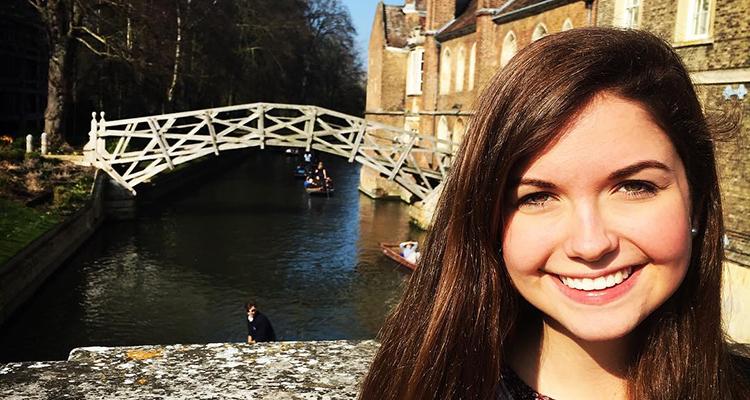
MLK Day of Service 2019
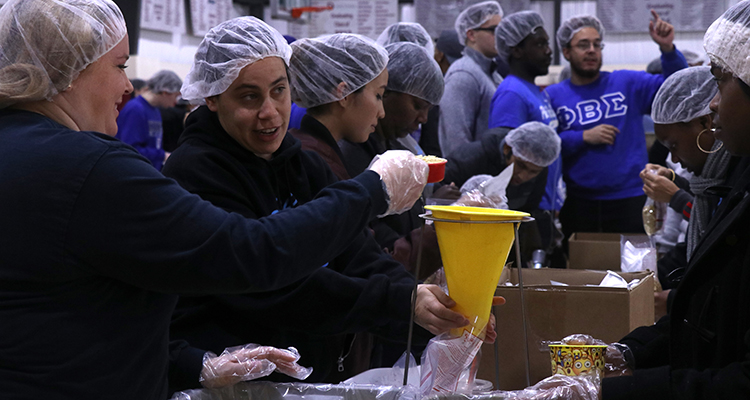
On January 21, 2019, Southwest Durham Rotary Club hosted its annual MLK Day of Service in Durham. Southwest Durham Rotary Club partnered with other Durham Rotary Clubs, as well as Duke University, Interfaith Food Shuttle, Meals of Hope and The Duke School, packed over 100,000 meals that were distributed to North Carolina food banks in Durham, Orange, Wake, Chatham and Johnston Counties. Over 200 volunteers from Rotary, Duke, Duke School and the Durham community packed this many meals in less than four hours.
The event was held at The Duke School, and the materials provided by Meals of Hope, a non-profit founded by Rotarians that began as a food packing organization focused on food packed for the United States. They developed five meals for the American palate, and added vitamins, minerals and proteins. Learn more about Meals of Hope here.
Southwest Durham Rotary Club applied for and received a $19,000 district grant from Rotary District 7710, with this project serves as its annual Priority One grant.
Below are photos from the day!
An Update from Rotary Scholar Catherine Ward
Catherine Ward, who recently graduated from Duke University, is a Rotary Scholar studying at the University of Cambridge. She is sponsored by Southwest Durham Rotary Club. Below is her first update after having arrived in the U.K. 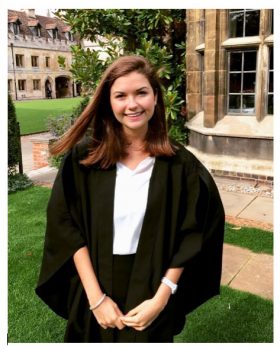
I am writing after having been in the U.K. for less than a week. However, it has been a packed week, and I have quickly fallen in love with the University of Cambridge. I am a member of Pembroke College Cambridge, which was founded in 1347 and is the third oldest in Cambridge. Earlier this week, I matriculated to both the college and the university. Matriculation is a formal ceremony in which you wear traditional academical dress and sign your name as an official member of both the college and the university. I have attached a photo from my matriculation.
As a graduate ‘fresher,’ or new student, I have enjoyed learning more about university life from students already attending Cambridge. I have been grateful for the community atmosphere at my college – everyone has been incredibly welcoming. Moreover, I have enjoyed meeting with Rotary Scholars attending other colleges here at Cambridge. The Rotary community in East Anglia is quite strong, and I am doing my best to send the U.K. warm feelings from District 7710. The Cambridge Rutherford Club is hosting me during my time in the U.K.
I have begun my course, and during this term, which is called Michaelmas Term, I am preparing research on equity in education, a concept I am first probing philosophically before applying it to my interests in refugee youth. I have a spectacular supervisor, and I am taking a Research Methods Strand to enhance my research abilities. My MPhil group in the Education, Globalisation, and International Development track is a remarkably diverse bunch, with students from all around the world. I am excited to learn from individuals who come from different backgrounds than me over the course of this year.
I can not put my gratitude to District 7710 into words. I will do my best to serve as an ambassador of goodwill while here and to grow in a manner that will allow me to impact basic education and literacy in the future.
Chris Lara – Summer 2018: My Applied Field Experience in Two Parts
Chris Lara is a second-year Rotary Peace Fellow from Colombia hosted by Southwest Durham Rotary Club. He is studying at Duke’s Sanford School of Public Policy. Below is an excerpt from a blog he wrote about his applied field experience. I’ll link to the complete piece on the Rotary Peace Center blog.
“We are in the business of aspirations. We are in the business of dreams. And optimism is synonymous with creativity. Furthermore, optimism is our responsibility” – Luis Miguel Massianu (quote to Francis Lethem)
Foreword: One Summer – Multiple Applied Field Experiences
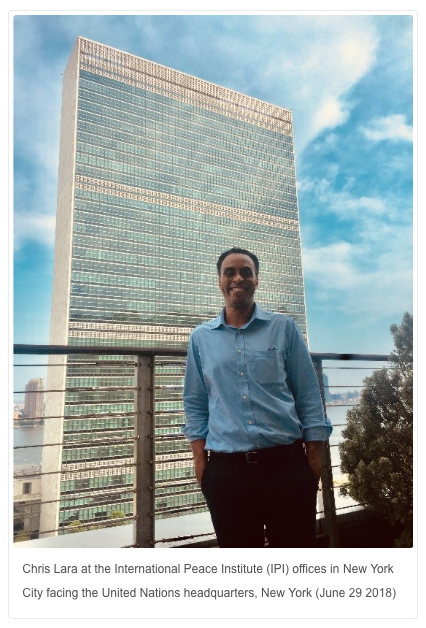 We live with constantly changing technology and a global economy that demands a versatile, mobile and multidisciplinary workforce, able to respond quickly to disruptions in many facets of our lives.
We live with constantly changing technology and a global economy that demands a versatile, mobile and multidisciplinary workforce, able to respond quickly to disruptions in many facets of our lives.
Since the beginning of my fellowship, I have been constantly and intentionally out of my comfort zone, and as a result, I have developed a particular understanding of career pathways at this mid-career point in international public service. I have realized that even for personal/professional development we need more connectivity awareness, planning, financing, leadership and coordination: professional management for superior impact.
During the last year at the Sanford School of Public Policy, I have undertaken academic projects related to the role of policy in responding to the shifts on nature of employment and the future of work. Specifically, in addressing the ways policy is responding to those changes and how personally we prepare for it. That is something that has triggered my curiosity and this applied field experience (AFE) was an opportunity to turn theory into practice.
My AFE encompassed a variety of interests that I have developed throughout my academic and professional careers. In addition to completing two academic courses, during the last three months, I have had the opportunity to work on two consultancy projects with two clients, operating from seven different cities1 I worked on the identification, outreach and coordination of the necessary partnerships, I held meetings with more than 30 stakeholders, and laid the groundwork for advocacy opportunities for future Rotary Peace Fellows (RPF) and Institute of Economics and Peace/Global Peace Index Ambassadors, as part of my role as IEP GPI Ambassador.
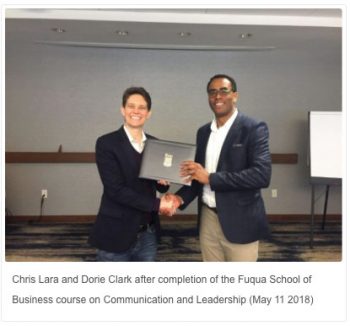 One of the most interesting aspects of my AFE was the opportunity to explore the possibilities for use of technology for emergency preparedness and response with the PAHO-World Health Organization office for the Americas at its headquarters in Washington DC and The Hague Humanity Hub in The Hague and Zurich.
One of the most interesting aspects of my AFE was the opportunity to explore the possibilities for use of technology for emergency preparedness and response with the PAHO-World Health Organization office for the Americas at its headquarters in Washington DC and The Hague Humanity Hub in The Hague and Zurich.
In addition to two consultancies during my AFE, I was a fellow with the Duke Global Policy Program in Geneva (blog on my experience) and I participated in an intensive summer course on communication and leadership at Duke University’s Fuqua School of Business. In Geneva, I participated with former and current RPFs in the founding meetings of the Rotary Geneva Peace Forum – hosted at the Geneva Center for Security Policy (GCSP), as well as in Tokyo and New York, where I advanced partnerships with key organizations (Peace Boat / EcoShip and IEP).
This blog will be divided into two parts: in part 1, I will present my personal and professional motivations, how this experience fits into the big picture and why it is an instrumental element and a benchmark of this two-year fellowship at Duke University as a Rotary Peace Fellow. In part 2, I will present my clients and give an outline of the substantive issues, and what are my expectations in regards to the impact.
PART 1 (a reflection)
Towards ‘The New Way of Working’
“Back to the beginning –the ‘why?’
On World Humanitarian Day, Sunday 19 August 2018, the United Nations Chamber Music Society performed a benefit concert for Yemen at a church in heart of Manhattan. With opening remarks by the Ambassador of Yemen to the United Nations (UN) and the UN Office for the Coordination of Humanitarian Affairs (OCHA), all proceeds from the concert were directed to Mercy Corps, to help support the most vulnerable people in Yemen. At present Yemen has a more than 2 million internally displaced persons, over 280,000 refugees, and 8.4 million people on the brink of famine.
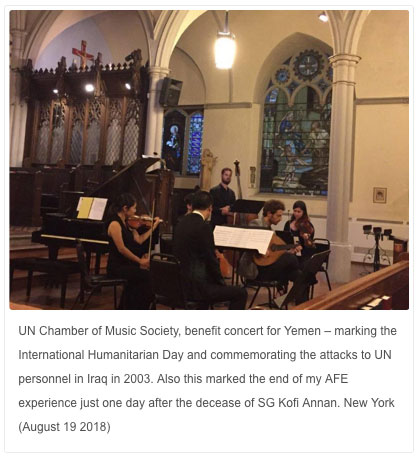 Exactly one day before my return to Durham, this event symbolically marked the end of my AFE, and couldn’t have been more well-timed: the concert for Yemen was one day after the unfortunate decease of former UN Secretary General Kofi Annan, and the same day as the commemoration of the unfortunate events in Iraq, back in August 2003, where the Canal Hotel in Baghdad (UN compound) was bombed with a death toll of 23 UN officials/friends/colleagues, including, unarguably, the loss of a true role model: Sergio Vieira de Mello.
Exactly one day before my return to Durham, this event symbolically marked the end of my AFE, and couldn’t have been more well-timed: the concert for Yemen was one day after the unfortunate decease of former UN Secretary General Kofi Annan, and the same day as the commemoration of the unfortunate events in Iraq, back in August 2003, where the Canal Hotel in Baghdad (UN compound) was bombed with a death toll of 23 UN officials/friends/colleagues, including, unarguably, the loss of a true role model: Sergio Vieira de Mello.
The heart of the eclectic repertoire performed by the chamber music was the ever-enigmatic sound of the oud3. It brought back memories of my first professional commitment with the humanitarian endeavor. It was the fall of 2009 in Ramallah, in the occupied Palestinian territories, when I was eager to engage in international cooperation work. But my fate was on different coordinates: a few weeks after arriving in Palestine, I received a job offer to serve the “we the peoples” mandate at the Emergency Services Branch of the Office for the Coordination of Humanitarian Affairs (UN OCHA) at the Palais des Nations in Geneva.
2009-2010 was a soothing winter in Geneva, and even though I was at the center of the UN global humanitarian coordination, no one could imagine the devastation and overwhelming effects of the emergencies which occurred in the following six months:
Between January and February 2010, two major earthquakes hit the Americas with catastrophic consequences: a 7.0 earthquake in Haiti on 12 of January and an 8.8 earthquake in Chile on 27 February taught us that we never know if we are actually prepared. The first earthquake, due to its impact and the second, due to its intensity, became turning points in the way the emergency response systems were to be implemented.
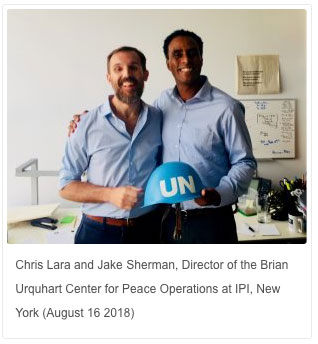 Additional ‘out of scale’ disasters occurred that year: as a result of heavy monsoons in the Khyber Pakhtunkhwa, Sindh, Punjab and, Balochistan regions of Pakistan, more than 20 million people were directly affected by large-scale flooding, and my office at the Surge Capacity Section of UN OCHA was at the forefront of the UN coordination.
Additional ‘out of scale’ disasters occurred that year: as a result of heavy monsoons in the Khyber Pakhtunkhwa, Sindh, Punjab and, Balochistan regions of Pakistan, more than 20 million people were directly affected by large-scale flooding, and my office at the Surge Capacity Section of UN OCHA was at the forefront of the UN coordination.
Additional ‘out of scale’ disasters occurred that year: as a result of heavy monsoons in the Khyber Pakhtunkhwa, Sindh, Punjab and, Balochistan regions of Pakistan, more than 20 million people were directly affected by large-scale flooding, and my office at the Surge Capacity Section of UN OCHA was at the forefront of the UN coordination.
The following year at New York HQ with the Coordination Response Division of UN OCHA, I worked first on the preparations for the hurricane season in the Caribbean, and then after, with the UN Peacekeeping Operations (UNDPKO) Office of the Rule of Law and Security Institutions on advocacy to ban antipersonnel mines and the first sketches of essential regulatory framework for a peace agreement in Colombia. That period epitomized the intermezzo of my participation in large crises: my next assignment was meant to be with the global Ebola outbreak response in West Africa… and the Crisis in South Sudan -right before traveling to Durham, exactly one year ago.
These experiences provided me with invaluable insights and the sense of urgency to improve our way of work. Bridging the spurious divide among development, humanitarian, peace & security and public health sectors never was a theoretical issue but a very tangible one: in order to save lives we should do more with less and at the same time tackle the determinant and amplifier factors of poverty, humanitarian crises and social unrest (climate change, attacks to multilateralism, weakening of international leadership and governance, corruption etc.).
My experience in past humanitarian complex emergencies, natural disasters and public health crises has shown me that no crisis is alien to political circumstances and there are not apolitical ways of responding to them. But there is a moral compass, a corpus of doctrine that supports the hard task of brokering and convening. A world organization that with all its imperfections represent the noblest aspirations of humankind serving as a moral and humanizing force through the powerful notion of ‘we the peoples’.
The oud has stopped, its enchanting sounds have faded away and I am here in the heart of Manhattan, with the firm conviction that now more than ever before, that multilateral mandate from humanity should be strengthened and protected, as we cannot turn back the clock to simpler times.
Read about the rest of Chris’ experience on the Rotary Peace Center blog here.
